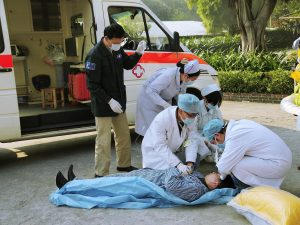Dinas Damkar Pesisir Barat Laksanakan Penyemprotan Disinfektan Secara Rutin di SPBU

Dinas Damkar Pesisir Barat, an essential agency in the Pesisir Barat Regency, plays a significant role in ensuring public safety and health, particularly in times of health crises. One of the agency’s pivotal initiatives is the routine disinfection spraying at significant public places, including SPBU (Fuel Stations). This proactive approach not only mitigates the risk of disease transmission but also fosters public confidence in essential services amidst health concerns.
The SPBU, a hub of activity and necessity for the local community, serves as a crucial point for fuel access, especially for vehicles essential for daily transportation, agriculture, and commerce. Given the high volume of foot traffic, the risk of contagion in these areas can be substantial. To combat this issue, Dinas Damkar Pesisir Barat has implemented a comprehensive disinfecting program aimed at sterilizing all accessible surfaces.
The routine spraying involves the use of potent yet safe disinfectants that comply with health regulations. Trained personnel are equipped with appropriate protective gear, ensuring not only their safety but also the efficacy of the disinfection process. The spraying targets high-touch areas such as fuel pumps, payment kiosks, and surrounding facilities. This systematic approach prioritizes areas most likely to harbor pathogens, thus providing a higher degree of safety for both employees and patrons.
Collaboration with local health authorities has been a cornerstone of Dinas Damkar’s operations. By aligning their efforts with public health guidelines and recommendations, the agency ensures their procedures are current and effective. Regular communication with health officials enables the agency to adapt its disinfection protocols based on emerging scientific data or shifts in public health recommendations. This adaptability is crucial in responding to an evolving health landscape, particularly in the context of recent global health concerns.
Community engagement is another vital aspect of Dinas Damkar’s initiative. Information campaigns are conducted alongside the disinfection efforts, educating the public on the importance of hygiene and preventative measures against viral infections. Flyers, local announcements, and social media updates inform residents about the disinfection schedules and provide tips on maintaining personal hygiene practices. Such educational outreach not only amplifies the agency’s impact but also fosters a collective sense of responsibility among community members.
The logistics of conducting disinfection efforts at multiple SPBUs across Pesisir Barat are meticulously planned. The agency utilizes a strategic calendar to ensure that each site receives attention without overwhelming the available resources. This scheduling allows for consistency in disinfection efforts while minimizing disruption to the fuel supply services. Moreover, feedback from SPBU managers and customers is solicited regularly, helping to refine the process and address any concerns that arise effectively.
In addition to the immediate health benefits, the routine disinfection process holds long-term advantages for public perception and trust. With heightened awareness around hygiene and safety, consumers are more likely to patronize businesses that demonstrate a commitment to public health. This trend is particularly relevant in the post-pandemic context, where consumers increasingly prioritize safety as a key factor in their decision-making processes. Dinas Damkar Pesisir Barat’s efforts not only protect public health but also contribute positively to the economic vitality of the area by promoting consumer confidence.
Moreover, the initiative has garnered attention beyond Pesisir Barat, positioning the agency as a model of effective public health communication and action. Collaborative efforts with neighboring regions and their respective authorities to share best practices and insights on disinfection strategies highlight the holistic commitment to community health and safety. This networking can lead to standardization of disinfection practices across various regions, enhancing the overall capabilities in disease prevention.
While the disinfection initiatives are an essential component of Dinas Damkar’s multifaceted public health approach, the agency remains alert to the challenges posed by emerging health threats. Continuous training and development for personnel are fundamental, ensuring they are well-prepared for any situation that may arise. Simulation exercises and workshops on the latest techniques in disinfection, personal protective equipment usage, and emergency response are regularly conducted to keep the team agile and effective.
This ongoing commitment to training extends beyond technical skills; it encompasses mental resilience and situational awareness. As first responders, Damkar personnel encounter various scenarios that could result in stress. By equipping them with both technical knowledge and support mechanisms, Dinas Damkar fosters a team that not only acts decisively but also remains resilient amidst challenges.
The integration of technology in disinfection practices has also begun to take precedence. Advanced spray systems that minimize chemical exposure while maximizing efficiency are being explored. Innovations such as drones equipped with disinfection mechanisms are on the horizon, promising to expand the reach and speed of these essential public health measures. Such advancements can future-proof the agency’s efforts, ensuring that even larger public gatherings or facilities can be efficiently managed.
Dinas Damkar Pesisir Barat also actively monitors the effectiveness of its disinfection practices through community feedback and health metrics. Surveys and health data collected from local clinics provide insights into infection rates and public perceptions of safety. This data-driven approach enables the agency to adjust its strategies based on real-world outcomes and community sentiment, reinforcing the effectiveness of the ongoing campaigns.
Collaboration with educational institutions further enhances the program. Students studying public health can receive hands-on training through projects that align with Dinas Damkar’s initiatives. This collaboration not only enriches the educational experience for students but also fosters a new generation of public health advocates aware of the importance of hygiene and safety in their communities.
The routine disinfection of SPBUs by Dinas Damkar Pesisir Barat exemplifies a holistic approach to community health and a commitment to safeguarding public spaces. By ensuring thorough cleaning and sanitation, promoting community awareness, and leveraging collaboration and innovation, Dinas Damkar sets a standard for public health initiatives that other regions may aspire to emulate.



